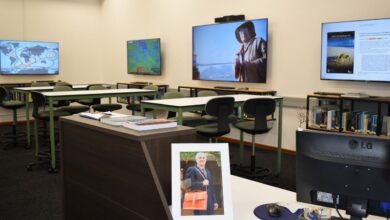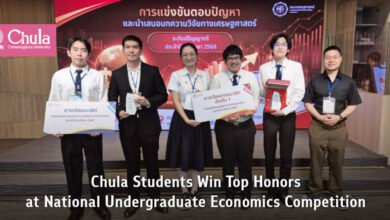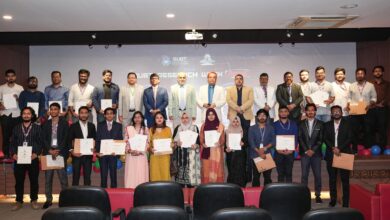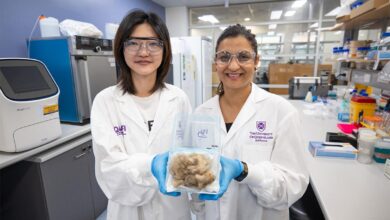Enhancing Understanding of Black Hole Information Loss: T. D. Lee Colloquium with Prof. Pisin Chen at Shanghai Jiao Tong University
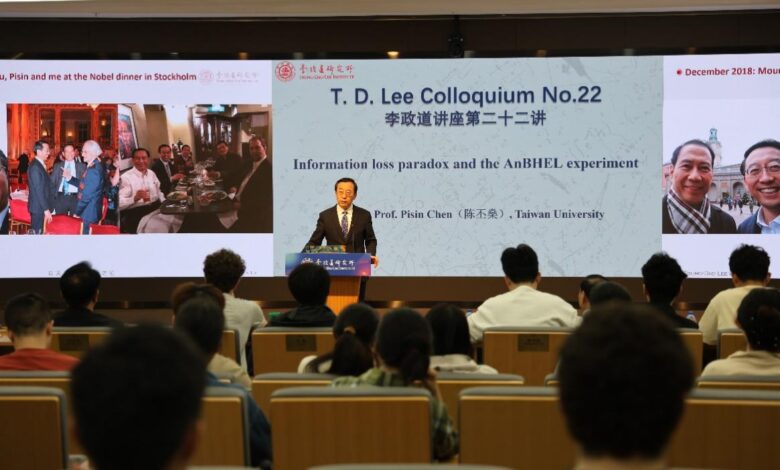
On April 24, Professor Pisin Chen from National Taiwan University delivered the 22nd T. D. Lee Colloquium at the Tsung-Tao Lee Institute. The event, titled “Information Loss Paradox and the AnaBHEL Experiment,” attracted over 90 in-person attendees, including students, postdoctoral researchers, and faculty members, and received more than 2,100 live stream views from audiences both domestically and internationally.
Presentation Highlights
In his lecture, Professor Chen presented findings from his research team regarding the quantum tunneling effect observed during black hole evaporation. This research proposes the existence of a superposition of multiple spacetime paths and a multi-history evolutionary model, which challenges the conventional understanding of a singular evolutionary trajectory for black holes. A modified version of the black hole entanglement entropy Page curve was also introduced, suggesting that the entropy of an evaporating black hole could exceed the classical Bekenstein-Hawking limit. This implication raises questions about how information might escape through the quantum entanglement properties of emitted radiation, thus contributing to ongoing discussions about information conservation in the context of black hole physics.
AnaBHEL Experiment
To further investigate limitations in astronomical observations, Professor Chen’s team developed the AnaBHEL experiment (Analog Black Hole Evaporation via Lasers). This initiative employs ultra-intense laser pulses to create phonon radiation analogous to Hawking radiation, allowing for the study of its quantum entanglement characteristics. Preliminary findings from 2023 indicate that the entropic behavior of this radiation is consistent with the predictions of the modified Page curve, suggesting a potential pathway for information to escape through entanglement processes.
Discussion and Future Directions
The colloquium concluded with a question-and-answer session that fostered discussions about the research’s implications and the future of the AnaBHEL experiment. Professor Chen addressed several audience inquiries and outlined prospects for further investigations, noting that positive results from the AnaBHEL experiment could significantly enhance the understanding of black hole information loss. Such advancements may provide experimental evidence for quantum gravity theories and clarify mechanisms for information preservation in Hawking radiation, contributing to the broader discourse surrounding quantum mechanics and general relativity.
Acknowledgments
At the event’s conclusion, Academician Jie Zhang presented Professor Chen with a commemorative certificate and a personalized portrait in recognition of his contributions to the colloquium.
Biography of Professor Pisin Chen
Professor Pisin Chen holds the position of Chee-Chun Leung Distinguished Chair Professor of Cosmology at National Taiwan University. He received his BS degree from National Taiwan University and completed his PhD in theoretical particle physics at UCLA, where he studied under Professor J. J. Sakurai. His professional trajectory includes postdoctoral work with Professor John Dawson and a significant tenure at SLAC National Accelerator Center. In 2000, he established the Pehong and Adele Chen Institute for Particle Astrophysics and Cosmology at Stanford University.
Having returned to National Taiwan University in 2007, he founded the Leung Center for Cosmology and Particle Physics (LeCosPA), serving as its director until the end of 2023. He now holds the title of Founding Director Emeritus of LeCosPA. Professor Chen is renowned for his pioneering research in particle-beam-driven plasma wakefield acceleration and has received several esteemed awards, including the 2018 Blaise Pascal Chair and the 2023 EPS-DPP Hannes Alfven Prize.
This summary aims to provide an informative overview of the event and its significance in the field of black hole research, without promotional intentions.
(Original source: Shanghai Jiao Tong University)

